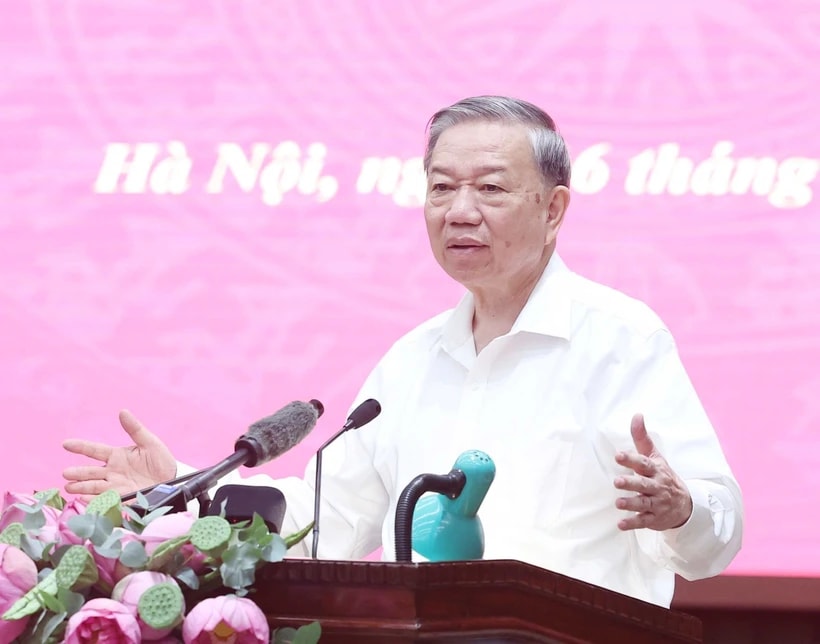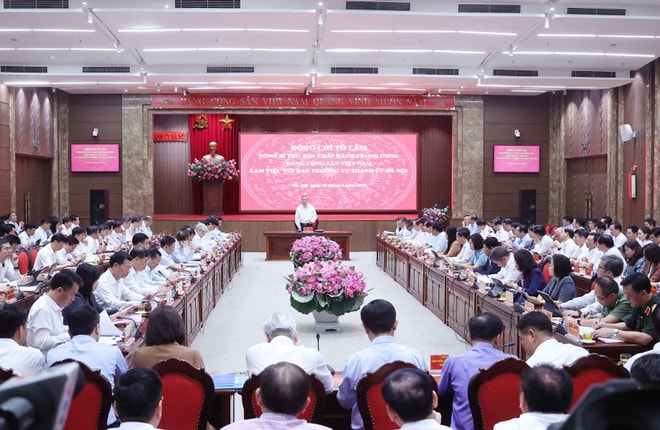Party chief urges Hanoi to forge new vision
Hanoi should be developed as a hub of innovation, finance, technology, and culture, imbued with Vietnam’s unique identity while deeply integrated into the global urban network, thus shaping the image of a green, smart, livable, and internationally attractive capital, said Party chief To Lam.

Hanoi (VNA) – Hanoi needs to shape a fresh vision in the new era, aiming to transform itself into a creative city where innovative talent, new ideas, and emerging technologies are prioritised and promoted, Party General Secretary To Lam said at a working session with repersentatives of the Standing Committee of the municipal Party Committee on June 16.
During his remarks, the Party chief acknowledged and spoke highly of strong efforts, determination for innovation and creativity, and effective actions taken by the municipal Party Committee, People’s Council, and People’s Committee in recent times.
As the administrative – political – economic - cultural and scientific centre of the country, Hanoi must take the lead and be more proactive and bold in streamlining its administrative apparatus, not only to meet internal demands but also to set an example and inspire reform efforts across the nation, he said.

Although Hanoi is not subject to provincial-level administrative unit mergers, it cannot and must not stand outside the process, he stressed.
As the capital city, Hanoi must set for itself higher goals and standards, and greater development aspirations to contribute significantly to the country’objectives, he noted, adding that it should promptly complete the restructuring under the two-tier local government model, in line with the spirit of Politburo’s Resolution 60 and Conclusion 150.
The restructuring must follow the principles of streamlining, efficiency, transparency, and smooth operation, with consistent guidance from the city to the grassroots level, the Party leader said, asking the municipal Party Committee to pay special attention to the proper placement of personnel following the reorganisation.
He urged Hanoi to establish a new economic identity based on knowledge, technology, and innovation, emphasising that creative industries, fintech, smart logistics, high-quality health care and education, and experiential tourism must become key growth drivers.
The city should take bold steps to explore new development models, viewing the night-time economy as an integral part of cultural and consumer diversity, advancing circular and green economies as a responsible pledge to the future, and adopting the creative urban model as a basis for driving social innovation, he stated.
Key zones should be reorganised not only for faster growth but also to become hubs that attract talent—where researchers, entrepreneurs, artists, and designers can enjoy a high quality of life while advancing their careers, he added.
Hanoi's development vision should go beyond national leadership and aspire to become a dynamic and pioneering city of Asia, which truly lives up to its rich, thousand-year legacy, he said.
He ordered the capital city to restructure its development space towards openness, polycentric growth, and regional integration, enabling it to lead the development of the country. He underlined the need for Hanoi to implement tailored mechanisms, policies, planning, and decentralisation measures, along with specific urban governance models, to enable each zone to grow independently with its own appeal and vitality.
It is essential to re-establish a diverse and integrated infrastructure system—not just ring roads and expressways, but with a long-term vision for a fully integrated transportation network across the capital region.
Hanoi should transform its rural areas from merely serving as urban support zones into smart green belts that combine safe and high-tech agriculture with preserving ecology and landscapes, traditional village culture, and piloting models of circular economy, experiential farming, and local tourism, he said.
As the core of the capital region, Hanoi must also spearhead interprovincial cooperation programmes in logistics, education, digital transformation, tourism, green economy, and circular economy within a new administrative and economic framework, positioning itself as the nucleus for building a shared regional development ecosystem.
He asked the municipal authorities to take measures to proactively remove institutional barriers that are hindering the growth of private enterprises, including issues related to access to capital and land, investment procedures, bidding, land leasing, and technology innovation.
Hanoi should be developed as a hub of innovation, finance, technology, and culture, imbued with Vietnam’s unique identity while deeply integrated into the global urban network, thus shaping the image of a green, smart, livable, and internationally attractive capital, he concluded./.
